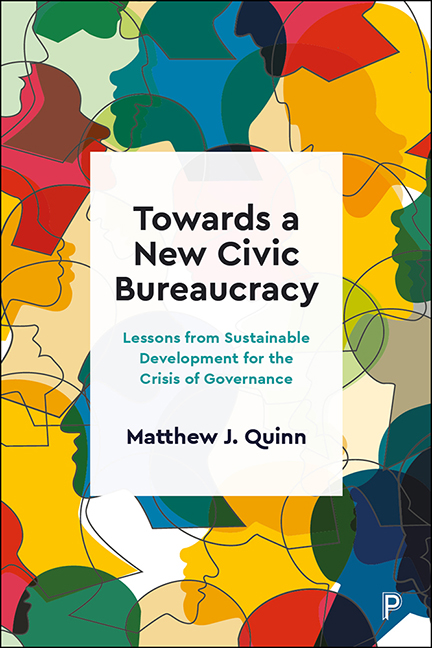Book contents
- Frontmatter
- Dedication
- Contents
- List of figures and tables
- Introduction
- 1 Framing the thinking
- 2 Governance and sustainable development as governmentality
- 3 Bureaucratic practice and governmentality
- 4 Lessons from governing for sustainable development
- 5 A new civic bureaucracy
- Closing words
- Appendices
- References
- Index
Appendices
Published online by Cambridge University Press: 15 September 2022
- Frontmatter
- Dedication
- Contents
- List of figures and tables
- Introduction
- 1 Framing the thinking
- 2 Governance and sustainable development as governmentality
- 3 Bureaucratic practice and governmentality
- 4 Lessons from governing for sustainable development
- 5 A new civic bureaucracy
- Closing words
- Appendices
- References
- Index
Summary
Appendix 1: Enabling co-productive deliberative democracy in places – a guidance note
Abstracted from: Quinn and de Vrieze (2019)
Understanding place
Why does place matter?
Place links people together
People with different experiences come together in places. Place provides a context in which people have things in common and can interact with each other.
Place links different systems
Places are inherently connected. Social, economic and ecological aspects of life are very visible and the links between them more tangible when viewed from the perspective of place.
Place has meaning
Places have meaning for people. Place can connect individual values and collective identities. Shared sense of place can be a motivation for action.
Place shapes opportunities and barriers
The physical form of places, their infrastructure, ownership and uses shape how we can live our lives and can enable or disable sustainable pathways.
What do we mean by place?
Place is recognisable as a place
There is no set size for what constitutes place but it is usually a combination of a physical identity – a village, small town or landscape, or even a workplace – and a shared social sense of place and identity. Place is at its best as a forum for developing action when there is genuine sense or senses of place and identities.
Place can operate at different scales
A place that makes sense for one issue or question may not for another. The optimum scale or scales for addressing an issue should reflect the needs of the topic and of the likely participants, not what is simplest for the organizer. Often action will be needed at different scales to address an issue.
Place cuts across boundaries of wealth and institutions
Places throw people together. This is part of the power of place as a means of co-producing new approaches. It does not respect boundaries that can otherwise break up an issue into sectoral or administrative divides or favour one group over another
Place makes otherwise abstract ideas real
Place is a real physical case for discussion. The impacts of one decision for other issues or of one group's priorities over another's are tangible and debated in the same room. The physicality of place also determines available options and opportunities
- Type
- Chapter
- Information
- Towards a New Civic BureaucracyLessons from Sustainable Development for the Crisis of Governance, pp. 125 - 145Publisher: Bristol University PressPrint publication year: 2022



